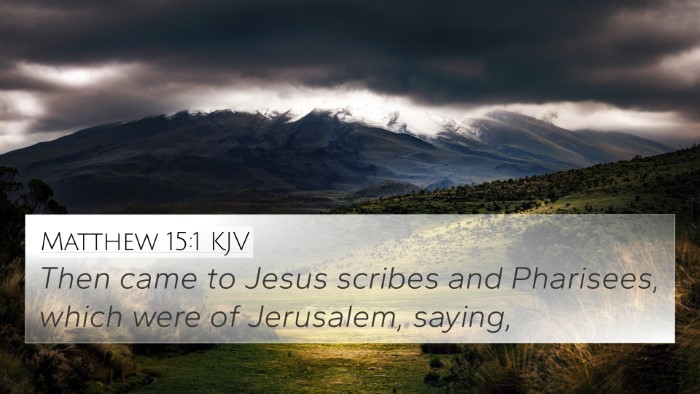Understanding Mark 7:1
Mark 7:1 states: "Then came together unto him the Pharisees, and certain of the scribes, which came from Jerusalem." This verse introduces a significant confrontation between Jesus and the religious leaders of the time. Through a careful analysis of this verse, we can explore its meaning and implications, as highlighted in various public domain commentaries.
General Meaning
This verse serves as a precursor to a larger discussion regarding the ceremonial practices of the Pharisees and the teachings of Jesus. The Pharisees and scribes symbolize a group that upheld strict adherence to Jewish law and tradition, often elevating human traditions above divine commandments.
Commentary Insights
Matthew Henry's Commentary
Henry emphasizes the importance of the Pharisees' inquiry into Jesus' teachings. Their arrival from Jerusalem suggests an official investigation into His ministry. Henry notes that their questioning reveals the tension between tradition and the genuine spirit of God's law.
Albert Barnes' Commentary
Barnes points out that the Pharisees' approach reflects their desire to challenge Jesus' authority. Their focus on ceremonial cleanliness underscores their commitment to tradition over understanding the essence of the law. Barnes highlights that Jesus' response in the following verses abolishes the precedence of such traditions.
Adam Clarke's Commentary
Clarke notes the geographical significance of Jerusalem as a center of Jewish life and authority. He observes that the scribes, recognized as experts in the law, were sent to scrutinize Jesus, indicating their concern over His growing influence. Clarke also links this event to the broader theme of conflict between Jesus' teaching and established religious norms.
Key Themes
- Tradition vs. Divine Commandments: The Pharisees represent a legalistic approach to faith that prioritizes human-made laws over the grace offered by Christ.
- Authority of Jesus: The challenge to His authority by the religious leaders sets the stage for an exploration of true spiritual authority.
- Social Dynamics: The interaction between Jesus and the Pharisees speaks volumes about the societal tensions in first-century Judea.
- Context of Conflict: This encounter is part of a larger narrative showing the increasing opposition to Jesus and sets the tone for subsequent teachings.
Cross-References and Connections
This verse is interconnected with several other scripture passages that deepen its significance:
- Matthew 15:1-2: A parallel account where the Pharisees question Jesus about His disciples' lack of traditional ritual washing.
- Luke 11:37-38: An episode where Jesus dines with a Pharisee and addresses the issue of inward purity versus outward rituals.
- Isaiah 29:13: A prophecy that speaks of people honoring God with their lips while their hearts are far from Him, reflecting the Pharisees' behavior.
- John 7:48: A statement questioning whether any Pharisee, including the leaders, ever believed in Jesus, showcasing the division in beliefs.
- Mark 3:22: Describes the scribes attributing Jesus’ miracles to demonic powers, further illustrating their opposition to Him.
- Galatians 1:14: Paul's reflection on his previous zeal for traditional Judaism before encountering Christ serves as a reminder of the transition from law to grace.
- Acts 15:10: The apostolic decision regarding the necessity of following Jewish laws highlights the early church's struggle with traditions.
- Romans 10:2: Paul discusses the zeal of the Israelites without knowledge, paralleling the misguided fervor of the Pharisees.
Thematic Connections
Mark 7:1 serves as a key entry point for exploring various themes throughout the Bible:
- Legalism vs. Grace: The tension between law and grace is a prominent theme, connecting Old Testament laws with the teachings of Jesus and the apostles.
- Authority of Scripture: The questioning of traditional practices invites reflections on what it means to uphold Biblical authority.
- Spiritual Blindness: The inability of the Pharisees to recognize the truth in Jesus’ teachings highlights a continued theme of spiritual blindness found in various scriptures.
Applied Understanding
In modern terms, Mark 7:1 challenges believers to examine their own adherence to tradition and contrasting it with the requirements of a relationship with Jesus. As believers reflect on their practices, they may ask:
- Are there traditions that overshadow the core truths of our faith?
- How can we ensure that our worship and practices honor God sincerely?”
Conclusion
Mark 7:1 opens a dialogue not only about the confrontation with the Pharisees but also about the continuing relevance of Jesus' teachings in the lives of believers today. By employing applicable tools for Bible cross-referencing, such as a Bible concordance or Bible reference resources, readers can explore the rich tapestry of scriptural connections to gain a deeper understanding. The cross-references provided serve as pathways to reflect on similar themes and teachings throughout the Bible, leading to a comprehensive Bible cross-reference system for study and contemplation.






